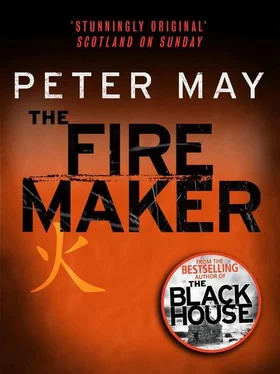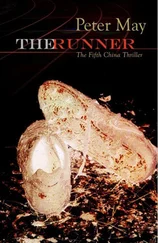‘I don’t need your help.’ He flashed an angry glance at her across the Jeep.
‘No? And how long would it have taken you to identify Chao Heng without me?’
‘We would have identified Chao Heng in time.’ His voice was steady and controlled.
‘Yeah, six weeks from now. And you’d probably still be looking at a suicide. Are you going to let me out or not?’
Li kept driving. ‘You know, what I don’t understand is why you ever came here in the first place.’ He knew that somewhere in this area she was vulnerable.
‘That’s none of your business!’
But he was not going to be deflected. ‘I mean, when I went to the States I spent months reading up on it. Constitution, law enforcement, culture… Hah.’ He laughed out loud. ‘If it’s possible to use the words American and culture in the same breath.’ She glared at him. ‘You decide to come to China, and what do you do? Nothing. You prepare nothing, you know nothing. About our law enforcement, our history, our culture. You’re in the country five minutes and you’re shouting the odds in the street about male attitudes to women drivers. You pick a fight in a restaurant and offend your hosts who’ve gone to great expense to welcome you.’
‘Welcome me?’ Margaret spluttered her indignation. ‘From the moment I arrived in this goddamn country people have been telling me what not to do, what not to say, in case I stepped on your precious Chinese sensibilities. You know, you people ought to lighten up and join the rest of us in what will very shortly be the twenty-first century.’ She immediately raised a hand. ‘And don’t tell me about your five-thousand-year history. I’ve already had that lecture. How you invented paper and the printing press.’
‘And the crossbow, and the umbrella, and the seismograph, and the steam engine — about a thousand years before the Europeans thought of it,’ Li said.
‘Jesus,’ Margaret gasped. ‘Spare me. Please.’
But Li was on a roll. ‘And what has America given the world? The hamburger and the hot dog?’
Margaret was stung. ‘We invented the light bulb, the means of generating electricity on a commercial scale, the gramophone, the motion picture. We put the first men on the moon, invented the microchip, the personal computer, developed technologies that allow people to communicate around the world in nanoseconds, and send pictures from Mars with better definition than Chinese television. Jesus, everything you people did was in the past. All you can do is look back. We’re doing it now .’
Li flushed with anger, his knuckles white on the steering wheel. ‘Oh yes? And just what exactly is it you are doing now?’ He raised a hand to stop her answering. ‘No, no, let me tell you. You stomp around the world like overbearing school bullies, self-appointed world policemen telling the rest of us how to live and how to behave. And if we don’t knuckle down and conform to your moral code, you’re just as likely to give us a bloody nose. You preach about freedom and democracy, and practise racial and political discrimination.’
‘That’s rich, coming from someone with your country’s human rights record!’
Li swung the Jeep hard left, honking his horn and driving like a man possessed. They swept past Mao’s mausoleum on their left, and the great expanse of Tiananmen Square opened up before them, the orange-tiled roof of the Gate of Heavenly Peace shimmering in the hazy middle distance. ‘Don’t start,’ he said. Hours of listening to his uncle debating world politics with his cronies had given him a good grasp of events over the past thirty years. ‘You’ll be telling me next how the United States had no part in supporting the murderous regime of the Shah of Iran, or in the downfall of the democratically elected president of Chile. That the United States was justified in dropping Agent Orange and napalm on innocent women and children in Vietnam, or in supporting tinpot dictators who were bleeding their people dry, because it suited US strategic policy.’
‘What about the thousands of political prisoners held in Chinese jails without trial?’
‘That’s history. Myth.’
‘Oh yes?’ She waved her hand out of the window at the square. ‘And I suppose it’s a myth that your government sent armed soldiers and tanks into this very square to mow down hundreds of unarmed students engaged in peaceful demonstration. Or is that just “history” as well?’
‘It’s as much history as the National Guardsmen who gunned down protesting students on campus at Kent State University in Ohio, in ’68. The only difference is one of scale.’ He breathed deeply in frustration and banged his open hands down on top of the steering wheel. ‘Dammit, I’m not trying to justify Tiananmen, but the Western view of it is a romantic fiction. Peace-loving students demonstrating for freedom and democracy? Hah! Your cameras never covered the gangs of armed youths roaming the suburbs, attacking and murdering soldiers and police who were under orders not to harm them, and then stealing their weapons. What would your government have done if it had seen its very existence threatened by a million ranting students in the streets of Washington demanding that the President and the Congress explain their policies to them in person, and then abusing and humiliating them on live TV? If gangs of thugs were beating police officers to death, and the seeds of insurrection were being sown throughout the fifty states, do you think they would just have stood by and done nothing?’
Beads of perspiration stood out on Li’s forehead. His eyes burned with a curious fervour. ‘It was a nightmare. I know, I was there.’ And the bloody images swam before his eyes, like the tears he had spilled during those four fateful June days, for the dead, for his country, for the devastating, wasteful futility of it all. ‘But I can look at China today,’ he said, ‘and I see people with money in their pockets, roofs over the heads, food in their bellies, education for their children, an economy growing at ten per cent a year. And I look at what is happening in the Soviet Union, or in Yugoslavia, in the name of freedom, and democracy. I see economic ruin, people going hungry, children dying of disease; I see war and rising crime and death and destruction in the streets. I don’t believe there are many Chinese who would swap what they have for that. You may not like communism, because you’ve been indoctrinated in the West by prejudice and preconception. But in China, for all its faults, it has brought stability and peace, and a population that is healthier, wealthier and better fed than at any time in its history.’
They had turned now into East Chang’an Avenue, Tiananmen Square receding behind them. Margaret glanced back, and tried to imagine the tanks rolling down the streets, the square jammed with a hundred thousand students. She recalled vividly the images that had flashed around the world of the student standing before a tank, refusing to let it past, and the tank driver’s attempts to get around him without hurting him. What bitter tears must have been spilled with the blood. She had heard the passion in Li’s voice, and understood perhaps for the first time the dreadful dichotomy inherent in those images. The wounds clearly still ran deep, and she wondered how it might have been if similar circumstances had presented themselves in the US. There had been rioting in the sixties and seventies over civil rights and Vietnam, divisions that had split the country down the middle. Only now, thirty years on, were some of those scars beginning to heal. Others were still raw.
She shook her head. ‘This is stupid,’ she said. ‘We’re doing what people do that makes them go to war — arguing over their differences. When it’s our differences that make us…’ She searched for the right words. ‘… human, unique.’ He said nothing, and they drove in silence along the length of Jianguomennei Avenue past the CITIC building and the World Trade Centre and up the ramp on to the third ring road. Eventually she said, ‘Where are we going?’ She needed a response from him. Any kind of response, to anything.
Читать дальше












